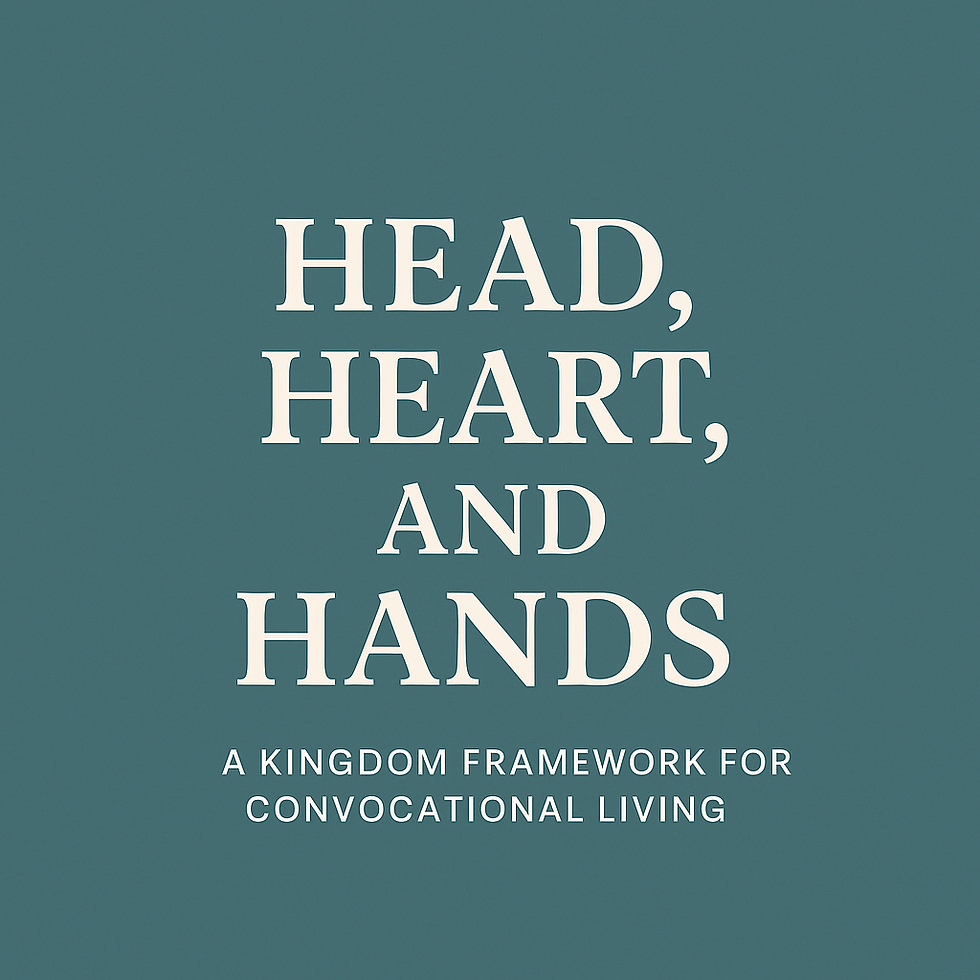Head, Heart, and Hands: A Kingdom Framework for Convocational Living
- Dave Miller

- Aug 6, 2025
- 3 min read
by Dave Miller

In a world fragmented by compartmentalized thinking, the sacred-secular divide continues to undermine the power of a fully integrated life in Christ. To step into our calling as convocational leaders—men and women who live with kingdom intentionality across all of life—we must recover a biblical framework that unites wisdom, love, and obedience. This isn’t theory—it’s formation.
Jesus didn’t call disciples to understand theology alone. He called them to know the truth (Logos), to embody love (Ethos), and to walk it out (Pathos). In this article, we’ll explore a framework that brings clarity to how we think, who we become, and what we do.
1. Wisdom (Logos): Biblical Situational Understanding
“The Head” — Seeing the Big Picture
Biblical wisdom isn’t simply the accumulation of knowledge—it’s situational awareness grounded in truth. Proverbs calls us to seek wisdom as silver and search for it as hidden treasure (Proverbs 2:4). But this wisdom isn’t abstract—it’s contextual, embodied, and anchored in God’s Word.
For convocational leaders, wisdom means knowing how to interpret the times and seasons. It means recognizing that the Great Commission is not a compartment of life, but the lens through which all of life is interpreted. Wisdom teaches us to:
See work as worship (Avodah), breaking the false binary between “ministry” and “secular” labor.
Understand where we are in redemptive history—living between the already and the not yet.
Acknowledge the patterns of culture and power (like exile, remnant, or renewal) that shape our context and response.
A wise leader doesn’t merely react. They discern. They observe. They recognize where the kingdom is breaking in and where strongholds still stand.
2. Love (Ethos): Principalities and Kingdom Values
“The Heart” — Humble, Rooted Identity
Love is not sentimental—it is sacrificial alignment with God’s character. Ethos is not branding—it’s the moral authority that comes from being rightly ordered under Christ.
When Paul wrote of spiritual warfare in Ephesians 6, he reminded us we don’t wrestle against flesh and blood but against principalities. These powers are not merely systems—they are spiritual realities that require spiritual formation to confront.
Convocational leaders embody kingdom values in the face of cultural pressure:
Joy instead of despair
Gratitude instead of entitlement
Sacrifice instead of self-preservation
Humility instead of platform-building
The ethos of the kingdom is best expressed not through platforms, but through presence. As ambassadors of Christ, our credibility comes from the cross-shaped life. We don’t overpower the world—we out-love it.
In a culture that prizes influence without responsibility, leadership without proximity, and progress without obedience, love anchors us. It makes us trustworthy in the eyes of both God and man.
3. Obedience (Pathos): Simple Habits and Tools
“The Hands” — Common Sense Kingdom Practice
The pathos of the gospel isn’t in its emotional pull but in its call to act. Obedience is the evidence of discipleship (John 14:15). It’s where conviction becomes behavior.
In convocational leadership, we aren’t looking for the extraordinary. We’re building with common sense obedience expressed through:
Simple, reproducible habits: Prayer rhythms, margin planning, sabbath keeping, missional calendaring.
Tools of multiplication:
3/3rds groups
MAWL (Model, Assist, Watch, Launch)
Story sets
Field-based training.
Accountability and consistency: The long obedience in the same direction that forms trustworthy leaders.
Faithfulness often looks unimpressive to the world. It’s loading the dishwasher, returning the call, showing up for the neighbor, or sharing Jesus at work. But these habits become spiritual architecture. They form us.
The Spirit moves through yielded vessels, not flashy strategies. And obedience is the yield point.
Conclusion: Living Whole in a Fractured World
Wisdom gives us clarity.
Love gives us credibility.
Obedience gives us traction.
Head, heart, and hands—Logos, Ethos, and Pathos—combine to form a life that reflects the fullness of Christ. The convocational life is not about dual identities. It’s about one identity, fully integrated under the lordship of Jesus.
In a world that separates purpose from profession, theology from vocation, and spirituality from responsibility, this framework offers a return to wholeness. A life lived with God, for God, and through God—in every space we touch.
Because in the kingdom, it’s not about titles. It’s about trust. And faithful presence wins the day.




Comments